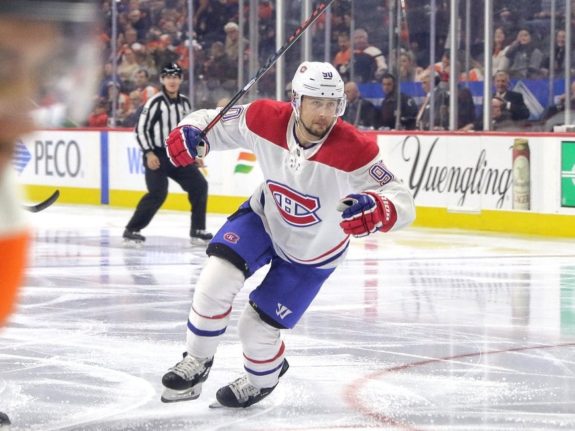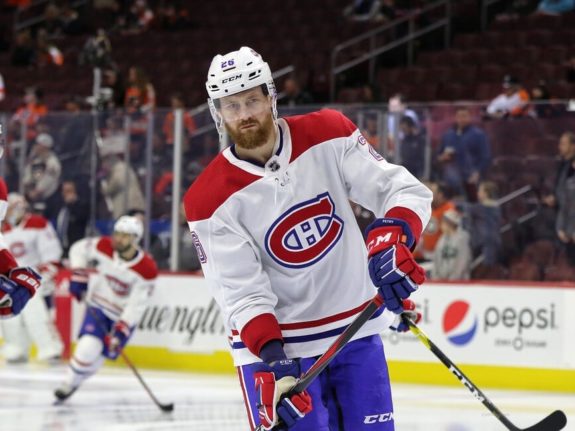Why did Montreal Canadiens general manager Marc Bergevin not trade Tomas Tatar or Jeff Petry at the deadline? Simply put, they are the two best performing players on the roster. I shudder to think where the Canadiens would be this season without Tatar and Petry, and it would be virtually impossible to replace them in time for the 2020-21 season if Bergevin had indeed succumbed to what would have been difficult offers to turn down at the trade deadline.
Related: Howie Morenz – Hockey Royalty
It shouldn’t come as a surprise that these proven veterans, both in their prime, are playing strong hockey for the Canadiens. But, are they contributing to the team at a level that surpasses others who play key roles for the team, like Phillip Danault or Shea Weber? It may seem like a stretch, but it’s about relativeness and size of impact.

Danault and Weber play big roles for the Canadiens as the No. 1 centre and defenseman, respectively. Although their impact on the Canadiens is very high, their overall work on the season doesn’t put them near the top of the league among their first-line peers. For Danault, his five-on-five play is excellent and even more impressive when one considers his difficult deployment against the other team’s top lines and high defensive zone starts.
But the level of his offensive contributions, including on the power play, is not enough to put him near the top of his position. As for Weber, both his offensive and defensive numbers don’t put him into Norris Trophy consideration. And, both players form part of a penalty-killing unit that ranks in the lower quarter of the NHL. It’s a case of a team’s primary players performing well, but not well enough to drag the team into the playoffs.
Tatar & Petry Top Performers from Secondary Role
Some might see Tatar and Petry as secondary players on the Canadiens’ roster, but their impact is anything but secondary. Tatar plays with Danault on the team’s first line, which always gets the most difficult matchups but nonetheless comes out as one of the best five-on-five lines in the NHL. But unlike Danault, Tatar contributes significant offensive production including on the power play where his scoring rates are among the best in the league. His 3.26 power-play goals per 60 minutes put him in elite company with the likes of Austin Matthews (3.17), Steven Stamkos (3.22) and Leon Draisaitl (3.56).
Related: Nick Suzuki Is the Canadiens’ Future
At five-on-five, Tatar also scores at an elite rate of 2.59 points per 60 minutes, second on the team behind Brendan Gallagher’s 2.62 points per 60 minutes. This puts both Canadiens’ players in the NHL’s top 25 for five-on-five points per 60 minutes. Both Gallagher and Danault do not come close to having the impact that Tatar delivers on the power play and, therefore, he is easily the most impactful forward on the team.
Using the Impact Chart above, we can see Tatar’s performance relative to his teammates and the rest of the NHL. The Y-axis is defensive performance, measured by expected goals against using Natural Stat Trick’s expected goals model, and the X-axis is offensive performance measured by points per 60 minutes. The quadrant labels help show that Tatar’s performance is deep into the Difference Maker zone because of both his strong defensive and offensive production.
Petry Among Most Underrated NHL Defensemen
Petry has never been described as the team’s No. 1 defenseman, however, his ability to play in all situations, log a ton of ice time and contribute at an elite level both defensively and offensively make him the Canadiens’ most impactful defenseman. Playing behind Shea Weber, who gets the harder matchups, definitely helps Petry to maximize his performance, but this fact should not discount the relative impact Petry has been able to exploit in this position.
Two key metrics to measure performance for defensemen on the chart below are possession, measured by shot attempts share on the X-axis (CF%), and suppression of quality attempts against on the Y-axis, measured by expected goals against; all at five-on-five play. Petry not only shines among his teammates, but he also has some of the best numbers in the NHL. On the chart, it’s easy to see Petry’s relative impact compared to his teammates and the NHL. Team logo size indicates the number of points the player scored; bigger indicates more points, which is important to distinguish the performance of a player such as Brett Kulak who has similar possession and suppression performance but not nearly the same impact as Petry on the scoresheet.
Like Tatar, Petry’s impact doesn’t just end with elite five-on-five play, it continues in other situations. For a weak Canadiens’ special teams, Petry produces points at a rate higher than Weber on the power play, and on the penalty kill he is the team’s best-performing defensemen suppressing scoring chances against at 15.97 expected goals against per 60 minutes, better than the average NHL defenseman (minimum two minutes penalty kill time on ice) and the best Canadiens’ penalty killer to play more than 100 minutes while shorthanded.

When the game is on the line, Petry seems to rise to the occasion as we’ve seen during exciting three-on-three overtimes where he has scored two game-winning goals and leads the team with three game-winning goals overall.
It’s no wonder Bergevin didn’t trade either of these players before the NHL trade deadline; they are pretty much irreplaceable. It’s hard to imagine where this team would be without the standout performances of Tatar and Petry this season.